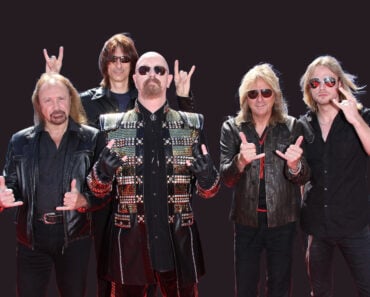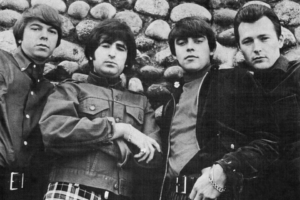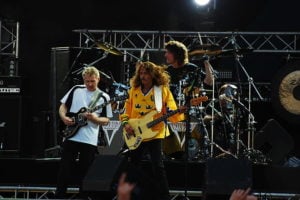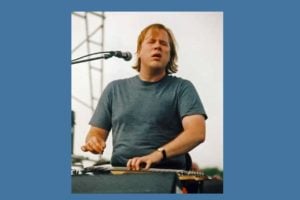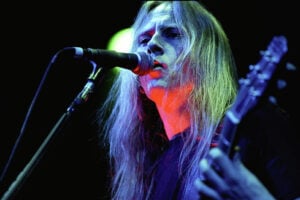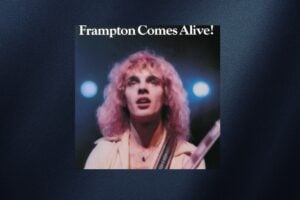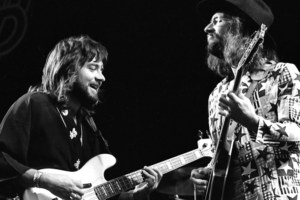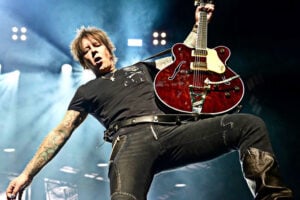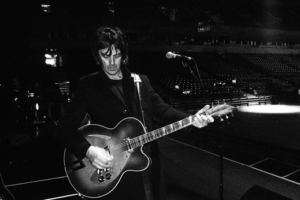
Feature Photo: Shadowgate, CC BY 2.0 <https://creativecommons.org/licenses/by/2.0>, via Wikimedia Commons
Uriah Heep formed in 1969 when guitarist Mick Box recruited a lineup that would become one of hard rock’s most enduring acts. The band has released 25 studio albums of original material, 20 live albums, and 41 compilation albums. Twelve of the band’s albums charted in the UK, with Return to Fantasy reaching number seven in 1975, while Demons and Wizards peaked at number 23 on the Billboard 200 in 1972. The band achieved massive commercial success particularly in Germany during the late 1970s, where the single Lady in Black became a major hit. The band’s best selling album is Sweet Freedom, released in 1973, with worldwide sales exceeding six million copies. Throughout their 56-year history, Uriah Heep has experienced numerous lineup changes, with Box remaining as the sole original member, while the band has sold over 40 million albums worldwide.
The band’s origins trace back to 1967 when Box formed a group in Brentwood, Essex. After the band’s singer departed, drummer Roger Penlington suggested his cousin David Garrick as a replacement, and Box and Garrick formed a songwriting partnership before deciding to pursue music professionally. The group evolved through several incarnations before becoming Uriah Heep in 1969, named after a character from the Charles Dickens novel David Copperfield. The band’s distinctive sound featured heavy keyboard work, strong vocal harmonies, and a fusion of progressive rock and heavy metal elements. Despite often facing critical dismissal during their peak years, Uriah Heep built a devoted international following and influenced countless musicians in the hard rock and progressive metal genres.
Complete List Of Uriah Heep Band Members
Mick Box
Mick Box stands as the only constant member throughout Uriah Heep’s entire history, having co-founded the band in 1969 and continuing as lead guitarist to the present day. Box began his musical journey in 1967 when he formed a band called Hogwash in Brentwood, Essex, playing local clubs and pubs. When the band needed a new singer, Box partnered with David Garrick (later known as David Byron), and together they formed a songwriting partnership and decided to turn professional. This partnership evolved through the bands The Stalkers and Spice before becoming Uriah Heep.
Box has appeared on every Uriah Heep release from their 1970 debut album Very Heavy Very Humble through their most recent recordings. His guitar work combines heavy riffing with melodic sensibility, and he has been instrumental in maintaining the band’s signature sound through multiple lineup changes. During the band’s peak period in the early to mid-1970s, Box’s wah-wah-driven guitar attack became a defining element of Uriah Heep’s sound. Box’s guitar work remained a central component as the band released Wake the Sleeper in 2008, which was nominated among Classic Rock’s albums of the year. Throughout the decades, Box has demonstrated remarkable resilience, persevering through the departure of founding members, navigating the band through commercial ups and downs, and rebuilding lineups when necessary.
Beyond his work with Uriah Heep, Box has remained focused primarily on the band rather than pursuing extensive outside projects. He has occasionally contributed to solo albums by other Heep members and participated in various collaborations within the rock community. Box fell off stage in Louisville, Kentucky on August 2, 1975, breaking the radial bone in his right arm, but persevered through both the set and the tour, receiving three injections nightly. His dedication to Uriah Heep has been unwavering, and he has successfully guided the band through periods when many considered them finished, including the challenging era after Ken Hensley’s departure in 1980 and the lineup instability of the early 1990s.
Ken Hensley
Ken Hensley joined Uriah Heep in late 1969 and served as the band’s keyboardist, guitarist, occasional lead vocalist, and primary songwriter until 1980. Born Kenneth William David Hensley on August 24, 1945, in Plumstead, south-east London, he moved with his family to Stevenage, Hertfordshire, learning guitar at age 12 from a Bert Weedon manual. Before joining Heep, Hensley had already established himself as a skilled musician through his work with The Gods and Toe Fat, bands that also featured future stars including Mick Taylor, Greg Lake, and Lee Kerslake.
Hensley was invited to join Spice (which became Uriah Heep) in Christmas 1969 by Paul Newton, as they sought a keyboard player to make their sound less bluesy and more progressive. His rich Hammond organ embellishments became central to Uriah Heep’s distinctive sound. During his tenure with the band from 1970 to 1980, Hensley wrote or co-wrote the majority of their most successful songs, including Lady in Black, Easy Livin’, Stealin’, Look at Yourself, and Free Me. He appeared on 13 studio albums with Uriah Heep, from Very Heavy Very Humble through Conquest, plus the live album Uriah Heep Live January 1973.
While still with Uriah Heep, Hensley recorded his first two solo albums, Proud Words on a Dusty Shelf in 1973 and Eager To Please in 1975, supported mainly by Mark Clarke and Bugs Pemberton. In 1980, Hensley left the band, unhappy with the musical direction they had chosen, and after attempting to form a new band in the UK called Shotgun, he later moved to the United States. His departure marked the end of an era for Uriah Heep, as he had been the primary creative force behind their most successful period.
Following his departure from Heep, Hensley collaborated with bands such as Blackfoot, W.A.S.P., and Cinderella, while building a successful solo career. He recorded numerous solo albums throughout the 1980s, 1990s, and 2000s, including Free Spirit (1980), Running Blind (2002), and later works with his band Live Fire. In 1997, Hensley established The Upper Room Studios in St. Louis, Missouri, where he was involved with several projects including A Glimpse of Glory with his band Visible Faith. He reunited with former Heep vocalist John Lawton for live performances and recordings in the 2000s. On December 7, 2001, both Lawton and Hensley appeared on stage with Uriah Heep during the annual Magician’s Birthday Party at the Shepherd’s Bush Empire in London, a concert that was recorded and released on CD and DVD. Hensley passed away on November 4, 2020, shortly after a brief illness.
David Byron
David Byron, born David Garrick on January 29, 1947, in Essex, served as Uriah Heep’s original lead vocalist from the band’s formation in 1969 until his dismissal in 1976. Byron was educated at Forest School, Walthamstow, from 1958 to 1964, where as a popular pupil he excelled at sports and was in the school’s first eleven football team. From the mid-1960s to early 1970s, he did session work for a company called Avenue Recordings, singing lead and backing vocals occasionally along with Mick Box on guitar and Paul Newton on bass.
Byron possessed a powerful operatic voice and flamboyant stage presence that became central to Uriah Heep’s identity during their peak years. He sang on ten Uriah Heep albums: Very Heavy Very Humble, Salisbury, Look at Yourself, Demons and Wizards, The Magician’s Birthday, Live, Sweet Freedom, Wonderworld, Return To Fantasy, and High and Mighty. His vocal range and dramatic delivery were particularly effective on fantasy-themed material and helped establish the band’s theatrical approach to hard rock.
In 1975, Byron released his first solo album, Take No Prisoners, which also featured fellow Heep members Box, Hensley and Lee Kerslake. However, Byron’s alcohol abuse became increasingly problematic. Byron gained a reputation for hard drinking, which eventually led to him being sacked from Uriah Heep at the end of a Spanish tour in July 1976. Manager Gerry Bron explained that Byron and the other Uriah Heep members had been in disagreement for some time over fundamental issues of group policy, and that the rest of the group felt they could no longer reconcile David’s attitude with their own.
After leaving Uriah Heep, Byron attempted to revive his career through several projects. Byron teamed up with former Colosseum and Humble Pie guitarist Clem Clempson and former Wings drummer Geoff Britton to form Rough Diamond, recording one self-titled album for Island Records in March 1977. He recorded three solo albums total: Take No Prisoners (1975), Baby Faced Killer (1978), and That Was Only Yesterday (recorded in 1984). Box and Trevor Bolder invited Byron to re-join Uriah Heep in 1981, after Ken Hensley had left, but Byron refused. Byron died of alcohol-related complications, including liver disease and seizures, at his home in Berkshire on February 28, 1985. He was 38 years old. His death shocked the music community and highlighted the personal toll of rock and roll excess during that era.
Paul Newton
Paul Newton served as Uriah Heep’s original bassist from the band’s formation in 1969 until 1971, appearing on the first three studio albums. Newton had previously been a member of The Gods alongside Ken Hensley, and it was Newton who invited Hensley to join the band that would become Uriah Heep. Newton played bass and provided backing vocals on Very Heavy Very Humble (1970), Salisbury (1971), and Look at Yourself (1971), helping to establish the band’s early sound.
Newton’s bass work on these early albums provided a solid foundation for the band’s heavy progressive rock style. His contributions were particularly notable on tracks from the Look at Yourself album, where the rhythm section anchored the band’s increasingly ambitious compositions. After departing Uriah Heep in 1971, Newton stepped away from the music industry’s front lines but maintained connections with his former bandmates. In 2019, he made a guest appearance with the band, reconnecting with the group he had helped establish nearly five decades earlier. Newton also participated in various reunion projects with former Heep members in later years, including performances with Ken Hensley and John Lawton.
Alex Napier
Alex Napier was Uriah Heep’s original drummer, playing on most of the tracks for the band’s debut album Very Heavy Very Humble in 1970. He was part of the band during their formative period when they were transitioning from their earlier incarnation as Spice. Napier provided the drumming for the majority of the debut album’s recordings, helping to establish the band’s early heavy sound. However, his tenure with the band was brief, and he was replaced before the album’s completion. Napier passed away in 2023.
Nigel Olsson
Nigel Olsson had a very brief stint as Uriah Heep’s drummer, playing on only two tracks of the band’s debut album Very Heavy Very Humble in 1970. Despite his minimal contribution to Uriah Heep’s catalog, Olsson went on to achieve significant success in the music industry. He became best known as Elton John’s longtime drummer, playing on many of Elton John’s most successful albums throughout the 1970s and beyond. Olsson also pursued a solo career, releasing several albums and achieving chart success with singles like Dancin’ Shoes. His work with Elton John made him one of the most recognized drummers in popular music.
Keith Baker
Keith Baker served as a drummer for Uriah Heep during their early period, appearing on one track on the US version of Very Heavy Very Humble (1970) and contributing to Salisbury (1971). Baker was one of several drummers who worked with the band during their formative years before Lee Kerslake joined and stabilized the drum position. His tenure with the band was relatively brief, but he was part of the crucial early period when Uriah Heep was developing their sound and building their initial following.
Iain Clark
Iain Clark served as keyboardist for Uriah Heep from 1970 to 1971, appearing on the album Look at Yourself (1971). Clark’s time with the band came during a transitional period in their lineup, and his keyboard contributions helped fill out the band’s sound on this album. However, his tenure was relatively short, and he departed before the band’s breakthrough period with Demons and Wizards.
Lee Kerslake
Lee Kerslake was one of Uriah Heep’s most important and longest-serving members, drumming for the band across two separate tenures: 1971-1979 and 1981-2007. Born Lee Gary Kerslake on April 16, 1947, in Bournemouth, Hampshire (now Dorset), he began playing drums at age 11 and got his first professional gig with The Gods in 1969, going on to record three albums with the band. He also played with Toe Fat and National Head Band before joining Uriah Heep in November 1971.
Kerslake first appeared with Uriah Heep on their 1972 album Demons and Wizards and went on to record nine studio albums as well as a live album with the band before departing in 1978 after the Fallen Angels tour. During his first stint, he appeared on some of the band’s most successful albums, including Demons and Wizards, The Magician’s Birthday, Sweet Freedom, Wonderworld, Return to Fantasy, Firefly, Innocent Victim, and Fallen Angel. His powerful drumming style and backing vocals became integral to the band’s sound during their commercial peak. Kerslake was nicknamed “The Bear” on the Firefly album in reference to his beard and solid physical build.
In 1980, Kerslake met ex-Black Sabbath vocalist Ozzy Osbourne by chance in a lift at the Kings Cross Hotel in Australia, and they soon formed a band that released the album Blizzard of Ozz with bassist Bob Daisley and guitarist Randy Rhoads. Kerslake’s work can be heard on Osbourne’s first two solo albums, Blizzard of Ozz and Diary of a Madman, as well as the 1980 Live EP and parts of the 1987 Tribute live album. Kerslake left Osbourne’s band in early 1981 to care for his mother, who had fallen ill.
In 1998, Kerslake and Daisley filed a joint lawsuit against Osbourne and his wife Sharon, seeking royalties and songwriting credits for their contributions to the Blizzard of Ozz and Diary of a Madman albums, with the Osbourne camp responding by removing their performances from the 2002 reissues and having them re-recorded. The lawsuit was ultimately dismissed in 2003, leaving both musicians bankrupt. Due to fan objection, the original bass and drum tracks were restored when the albums were reissued in 2011. After rejoining Uriah Heep in 1982 for the album Abominog, Kerslake remained with the band until 2007, when health problems forced his retirement. Kerslake passed away on September 19, 2020, after a battle with prostate cancer, just weeks before his longtime bandmate Ken Hensley.
Mark Clarke
Mark Clarke served briefly as Uriah Heep’s bassist in 1971-1972, appearing on only one track of Demons and Wizards (1972) and the single Why (1972). Despite his brief tenure with Uriah Heep, Clarke had an extensive career in rock music, working with various artists and bands throughout the 1970s and beyond. He had previously played with Colosseum and would go on to work with numerous other acts. Clarke also supported Ken Hensley during the recording of his early solo albums.
Gary Thain
Gary Thain served as Uriah Heep’s bassist from 1972 to 1975, playing on some of the band’s most successful albums. Thain joined the band for Demons and Wizards (1972) and appeared on The Magician’s Birthday (1972), Sweet Freedom (1973), and Wonderworld (1974). His bass playing brought a new dynamic to the band’s rhythm section, and he became an integral part of their classic lineup alongside Ken Hensley, David Byron, Mick Box, and Lee Kerslake.
However, Thain struggled with drug addiction during his time with the band. He became addicted to heroin, a problem he initially kept secret from other band members. His substance abuse issues became increasingly problematic, affecting both his performance and his relationships within the band. Thain’s drug problems led to him becoming an increasingly isolated figure within the band. He left Uriah Heep in 1975 and tragically died later that same year at the age of 27 from drug-related complications. His death was mourned by the band, and he was later honored alongside David Byron with dedications on the 1998 album Sonic Origami.
John Wetton
John Wetton brought his considerable talents to Uriah Heep as bassist and vocalist from 1975 to 1976, appearing on Return to Fantasy (1975) and High and Mighty (1976). Born John Kenneth Wetton on June 12, 1949, in England, he was known for his skilled right-handed bass playing despite being left-handed, as well as his booming baritone voice. Before joining Uriah Heep, Wetton had already established himself as a formidable musician through his work with Family and King Crimson.
Wetton joined King Crimson in 1972 and played with them through their legendary 1973-1974 run, appearing on the albums Larks’ Tongues in Aspic, Starless and Bible Black, and Red. His bass work and vocals on these albums are considered some of the finest in progressive rock. After King Crimson disbanded in 1974, Wetton worked briefly with Roxy Music before joining Uriah Heep in March 1975.
Wetton’s time with Uriah Heep was relatively brief but significant. Box remembered Wetton joining as a relief, describing him as solid and reliable with a load of ideas. The Return to Fantasy album, Wetton’s first with the band, revitalized Uriah Heep and reached number seven in the UK charts. However, the High and Mighty album proved divisive and was a commercial failure. After leaving Uriah Heep in 1976, Wetton went on to form the band U.K. with Bill Bruford, Eddie Jobson, and Allan Holdsworth.
In 1981, Wetton co-founded Asia as lead vocalist and principal songwriter, which became a supergroup whose self-titled debut album was released in 1982, selling ten million copies worldwide and becoming Billboard magazine’s number one album of 1982. Wetton’s work with Asia, particularly hits like Heat of the Moment and Only Time Will Tell, brought him his greatest commercial success. He continued working with Asia intermittently, released several solo albums, and collaborated with numerous artists including Brian Eno and Bryan Ferry. Wetton passed away on January 31, 2017, after a battle with colon cancer.
Trevor Bolder
Trevor Bolder was one of Uriah Heep’s longest-serving members, playing bass for the band across two separate periods: 1976-1981 and 1983-2013. Born on June 9, 1950, in Kingston upon Hull, East Riding of Yorkshire, England, Bolder’s father was a trumpet player and other family members were also musicians. He played cornet in the school band and was active in his local R&B scene in the mid-1960s, forming his first band with his brother in 1964 and taking up the bass guitar.
Before joining Uriah Heep, Bolder achieved fame as a member of David Bowie’s Spiders from Mars. He first came to prominence in the Rats, which also featured fellow Hull musician Mick Ronson on lead guitar, and in 1971 Bolder was called in to replace Tony Visconti in David Bowie’s backing band. His bass work appeared on the studio albums Hunky Dory (1971), The Rise and Fall of Ziggy Stardust and the Spiders from Mars (1972), Aladdin Sane (1973), and Pin Ups (1973). He is name-checked as “Weird” (Bowie’s nickname for Bolder) in the lyrics of the song Ziggy Stardust. He also played on Mick Ronson’s 1974 album Slaughter on 10th Avenue.
In 1976, Bolder joined Uriah Heep, replacing John Wetton, and worked on the albums Firefly, Innocent Victim, Fallen Angel and Conquest. When the lineup disbanded after Conquest, Bolder was the only member who remained committed to continuing. Needing to earn a living when attempts to form a new lineup temporarily stalled, Bolder accepted an offer in 1981 to join Wishbone Ash, playing on their 1982 album Twin Barrels Burning. However, by 1983 he returned to Uriah Heep, playing on all subsequent studio albums through Into the Wild. Beyond his bass playing and backing vocals, Bolder produced Heep’s 1991 album Different World.
Bolder died on May 21, 2013, after a long fight with pancreatic cancer, having performed with Uriah Heep for over three decades across his two tenures with the band. David Bowie paid tribute, stating that Trevor was a wonderful musician and a major inspiration for whichever band he was working with, but foremostly a tremendous guy, a great man.
John Lawton
John Lawton served as Uriah Heep’s lead vocalist from 1976 to 1979, replacing David Byron after his dismissal. Born in Halifax, England, Lawton brought a powerful blues-rock voice to the band during a transitional period. He appeared on the albums Firefly (1977), Innocent Victim (1977), and Fallen Angel (1978), as well as the live album Live in Europe 1979 (1986). Lawton also occasionally played acoustic guitar during his tenure with the band.
During the Lawton period, the band achieved massive success in Germany, where for some time there were three Uriah Heep singles sitting together in the German Top 20: Wise Man from Firefly, Lady in Black, and Free Me. The Firefly album sold over a million copies in Germany and became one of Uriah Heep’s most successful releases. After leaving Uriah Heep in 1979, Lawton pursued other musical projects and maintained connections with his former bandmates. He briefly rejoined Uriah Heep as a live substitute in 1995 and 2013, and made guest appearances in 2001 and 2019. He collaborated with Ken Hensley on various projects in the 2000s, including live performances and recordings. Lawton passed away in 2021.
Chris Slade
Chris Slade served as Uriah Heep’s drummer from 1979 to 1981, appearing on the album Conquest (1980). Slade brought a powerful, precise drumming style to the band during a challenging period in their history. Before joining Heep, he had already established himself as a skilled rock drummer, and after leaving the band he would go on to even greater success. Slade is perhaps best known for his work with AC/DC, playing drums on the album The Razors Edge (1990) and touring with them during the early 1990s. He also played with other notable acts including Tom Jones, Manfred Mann’s Earth Band, The Firm (with Jimmy Page and Paul Rodgers), and later rejoined AC/DC for another stint from 2015 to 2016.
John Sloman
John Sloman served as Uriah Heep’s lead vocalist and keyboardist from 1980 to 1981. He brought a different vocal style to the band and also contributed piano, percussion, and keyboards to their sound. Sloman’s tenure with Uriah Heep came during one of the band’s most turbulent periods, following the departure of Ken Hensley and the commercial disappointment of the Conquest album. During his brief time with the band, various members came and went, and the group struggled to find stable footing. After leaving Uriah Heep, Sloman pursued other musical projects and bands throughout his career.
Gregg Dechert
Gregg Dechert served as Uriah Heep’s keyboardist from 1980 to 1981, providing keyboards and backing vocals during a period of significant lineup instability. He appeared on the singles Love Stealer (1980) and Think It Over (1981). Dechert was part of the band during the challenging transition period after Ken Hensley’s departure, when Uriah Heep was searching for a new musical direction and stable lineup.
John Sinclair
John Sinclair served as Uriah Heep’s keyboardist from 1981 to 1985, appearing on three studio albums: Abominog (1982), Head First (1983), and Equator (1985). Sinclair joined the band during a crucial period of rebuilding after the instability of the early 1980s. The album Abominog received strong reviews, with Kerrang declaring it the most mature and perhaps best album of their career, and it did relatively well in the American charts reaching number 56. Sinclair’s keyboard work helped the band navigate this successful comeback period before he departed in 1985.
Peter Goalby
Peter Goalby served as Uriah Heep’s lead vocalist from 1982 to 1986, also occasionally playing acoustic guitar. He joined the band for their comeback album Abominog (1982) and appeared on Head First (1983) and Equator (1985). Goalby brought a more straightforward rock vocal style to the band compared to his predecessors. His tenure saw the band achieve renewed commercial success with Abominog, which marked a return to heavier material after the more AOR-oriented Conquest. Goalby’s vocals helped define this era of the band’s sound as they successfully performed at major festivals including Castle Donington Monsters of Rock in 1982.
Bob Daisley
Bob Daisley served as Uriah Heep’s bassist from 1981 to 1983, appearing on Abominog (1982) and Head First (1983). Before joining Heep, Daisley had already established himself as a highly respected bassist and songwriter in the rock world. He is particularly known for his work with Ozzy Osbourne, playing bass on Blizzard of Ozz and Diary of a Madman alongside Lee Kerslake. Daisley’s bass work and songwriting contributions were significant on both albums, though this led to legal disputes with the Osbourne camp over credits and royalties. He also played with Rainbow during the Ritchie Blackmore era and worked with Gary Moore. His time with Uriah Heep came during their successful comeback period with Abominog, and shortly before Head First’s release, he left to return to Ozzy Osbourne’s band. Daisley has maintained an extensive career as a session musician and songwriter, working with numerous artists throughout his career.
Phil Lanzon
Phil Lanzon has served as Uriah Heep’s keyboardist since 1986, making him the second-longest serving member after Mick Box. He provides keyboards and backing vocals, with occasional lead vocals. Lanzon has appeared on all Uriah Heep releases from Live in Moscow (1988) onwards, with the exception of Live on the King Biscuit Flower Hour (1997). His keyboard work has been central to maintaining the band’s classic sound while also helping them evolve. Lanzon’s tenure has spanned over three decades, during which he has contributed to numerous studio albums and participated in extensive touring. His stability and musicianship have been crucial to Uriah Heep’s longevity and continued success in the 21st century.
Bernie Shaw
Bernie Shaw has served as Uriah Heep’s lead vocalist since 1986, making him one of the band’s longest-serving members in that role. Shaw joined the band after the departure of Peter Goalby and has appeared on all Uriah Heep releases from Live in Moscow (1988) onward. His powerful vocals have helped define the modern era of Uriah Heep’s sound, and he has proven himself capable of handling both the band’s classic material and new compositions. Shaw’s vocal style combines power and melody, allowing him to interpret the dramatic material from the band’s early years while also bringing his own character to newer songs. His consistency and professionalism have made him an integral part of Uriah Heep’s continued success and touring schedule.
Steff Fontaine
Steff Fontaine briefly served as Uriah Heep’s lead vocalist in 1986. His tenure with the band was extremely short, lasting only months, and he did not appear on any official Uriah Heep releases. Fontaine was part of the band during a transitional period before Bernie Shaw joined and became the permanent vocalist. Despite his brief time with Heep, Fontaine went on to have a career in music, working with various other projects and bands.
Russell Gilbrook
Russell Gilbrook has served as Uriah Heep’s drummer since 2007, providing drums, percussion, and backing vocals. He joined the band after Lee Kerslake’s departure due to health issues and has appeared on all Uriah Heep releases from Wake the Sleeper (2008) onwards. Gilbrook’s arrival energized the band, with Wake the Sleeper tapping back into the band’s signature sound and being nominated among Classic Rock’s albums of the year. Gilbrook’s powerful and precise drumming has helped revitalize Uriah Heep, and his contributions have been central to the band’s continued creative output and live performances. His tenure has seen the release of multiple well-received studio albums and extensive international touring.
Dave Rimmer
Dave Rimmer has served as Uriah Heep’s bassist since 2013, providing bass and backing vocals. He joined the band following the death of Trevor Bolder and has appeared on all Uriah Heep releases from Outsider (2014) onwards. Rimmer’s bass playing honors the legacy of his predecessors while bringing his own musical personality to the band. His solid musicianship and stage presence have made him a valued member of the current Uriah Heep lineup, contributing to the band’s ongoing success and helping them maintain their position as active recording and touring artists well into the 21st century.
Check out more articles on ClassicRockHistory.com Just click on any of the links below……
Top 10 Uriah Heep Songs
Read More: Artists’ Interviews Directory At ClassicRockHistory.com
Read More: Classic Rock Bands List And Directory


